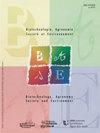组织文化在高等教育机构经营绩效中的作用
IF 0.6
4区 农林科学
Q3 AGRONOMY
Biotechnologie Agronomie Societe et Environnement
Pub Date : 2018-12-30
DOI:10.4013/BASE.2018.154.05
引用次数: 1
摘要
在本研究中,我们认为这是任何私立高等教育机构(HEI)的战略的一部分,以实现提高其学术和社会效益的目标,组织文化可以作为其竞争力的一个贡献因素,通过实现提高课程质量的目标。因此,本研究的目的是根据国家高等教育评估系统(SINAES)的质量指标,讨论组织文化在高等教育机构运营绩效中的作用。为此,我们使用Cameron和Quinn(2011)的组织文化评估工具(OCAI)进行了一项调查,以确定Espirito Santo的一家私营高等教育企业的文化概况,该企业已经在市场上存在了50年。结果表明,虽然在IES/ ES所分析的两组-教师和行政人员-之间的文化表现具有凝聚力,但宗族文化的作用一方面有助于竞争平等,即实现竞争平等-在其行业中的平均表现。另一方面,它也可能发挥限制作用,因为它在一个有许多竞争者的环境中运作,包括远程教育的强劲增长,以及对价格的激进,因此很难制定一项改善SINAES指标的战略。关键词:组织文化;高等学校;有效性本文章由计算机程序翻译,如有差异,请以英文原文为准。
O papel da cultura organizacional no desempenho operacional de uma instituição de ensino superior à luz dos indicadores de qualidade SINAES
In this study, we argue that it is part of the strategy of any private higher education institution (HEI) to meet the goals of improving its academic and social effectiveness and that organizational culture can act as a contributory factor of its competitiveness by meeting goals of improving the quality of courses offered. Thus, the purpose of this study is to discuss the role of organizational culture in the operational performance of a HEI in the light of the quality indicators of the National System for the Evaluation of Higher Education (SINAES). To do so, we conducted a survey using the Organizational Culture Assessment Tool (OCAI) by Cameron and Quinn (2011) to identify the cultural profiles of a private HEI from Espirito Santo, which has been in the market for 50 years. The results show that, although there is a cohesion in the cultural manifestations between the two groups analyzed – faculty and administrative staff – at IES/ ES, the role of a clan culture, on the one hand, has been contributing for a competitive parity, that is, to achieve a competitive parity – an average performance in its industry. On the other hand, it can also play a restrictive role by making it difficult to formulate a strategy to improve the SINAES indicators, considering that it operates in an environment with many competitors, including a strong growth in distance education, and aggressive towards prices. Keywords: organizational culture, higher education institution (HEI), effectiveness.
求助全文
通过发布文献求助,成功后即可免费获取论文全文。
去求助
来源期刊

Biotechnologie Agronomie Societe et Environnement
AGRONOMY-ENVIRONMENTAL SCIENCES
CiteScore
1.60
自引率
0.00%
发文量
12
审稿时长
6-12 weeks
期刊介绍:
BASE publishes original papers in the fields of life sciences: environmental science and technology, forest and natural space management, agronomical science, and chemistry and bio-industries.
 求助内容:
求助内容: 应助结果提醒方式:
应助结果提醒方式:


